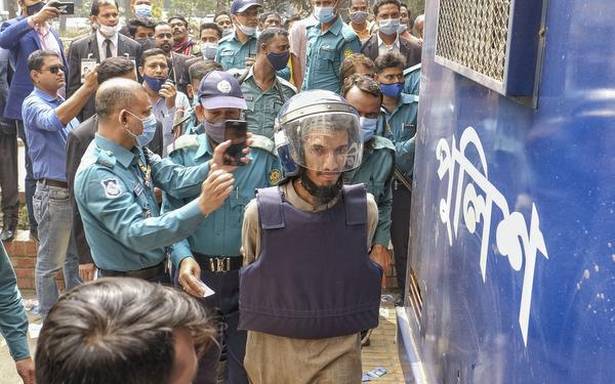Roy, a 42-year-old Bangladesh-born US citizen, was hacked to death by Islamist militants just after he left a book fair at the Dhaka University on February 26, 2015
A special anti-terrorism tribunal on Tuesday sentenced five members of a banned Islamist militant group, including a fugitive army major, to death and a sixth man to life in prison for the killing of prominent Bangladeshi-American atheist blogger Avijit Roy in 2015.
Roy, a 42-year-old Bangladesh-born US citizen, was hacked to death by Islamist militants just after he left a book fair at the Dhaka University on February 26, 2015. His wife Rafida Ahmed was also injured in the attack.
Roy was an outspoken critic of religious fundamentalism.
Judge Mojibur Rahman of Dhaka’s Anti-Terrorism Special Tribunal court sentenced five militants, including fugitive army major Sayed Ziaul Haq, to death in the Roy murder case, bdnews24 reported.
Another convict, Safiur Rahman Farabi, was jailed for life.
Four of the five convicts who received capital punishment are Md Mozzammel Hussain alias Saimon alias Shahriar, Md Abu Siddiq Sohel alias Sakib alias Sajid alias Shahab, Md Arafat Rahman and Akram Hossain alias Abir. Besides sacked Major Haque, Abir is also on the run.
The judge also fined these convicts Tk 50,000 each, besides handing capital punishment to them.
Tuesday’s verdict came nearly a week after Judge Rahman on Wednesday sentenced to death eight Islamic militants, including sacked Major Haque, for killing Roy’s publisher Faisal Arefin Dipon.
Dipon, the owner of Jagrity Publishers, was hacked to death at his office at central Dhaka’s Shahbagh area on November 31, 2015 months after the killing of Roy.
Six of eight convicts belonged to outlawed Ansar Al Islam terrorist group, also known as Ansarullah Bangla Team (ABT). The ABT was banned in May 2015 when one of its leaders was arrested and two members were sentenced to death for the murder of an atheist blogger in February 2013.
The prosecution submitted CCTV footage of the killing of Roy, video statements of the accused, their confessional statements and copies of SMS from their mobile phones to the court as evidence.
Bangladesh had witnessed an alarming rise of militant activities in 2015 when four "atheist" bloggers were murdered with authorities attributing the attacks to homegrown terrorists while Islamic State at that time had claimed responsibility for three attacks.
A 2016 cafe attack was the worst of the militant assaults when 22 people, including 17 foreigners, were killed, sparking a global uproar while a court subsequently sentenced seven of the eight suspects to death.
But it prompted the South Asian country with Muslim majority population to virtually declare a total war against Islamists engaging Army, paramilitary and elite police units that saw a series of countrywide raids on militant hideouts and deaths of dozens of extremists.
Source: Read Full Article

